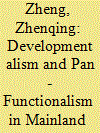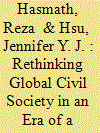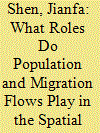|
|
|
Sort Order |
|
|
|
Items / Page
|
|
|
|
|
|
|
| Srl | Item |
| 1 |
ID:
181846


|
|
|
|
|
| Summary/Abstract |
How does strong state capacity in an authoritarian regime translate into police power? Do states with strong capacity enforce totalitarianlevel policies in all areas equally? This article uses an examination of frontline police work in three provinces in China to show that policing is enforced unequally by issue area, and that high degrees of variation exist even within the same policing agenda. Two factors are vital to explain the mode of daily frontline policing: political pressure (either oral or via written directive) and individual incentives (including promotion, pay, and sense of pride). The results indicate a typology of four policing modes: zealous, deceptive, selective, and lazy policing.
|
|
|
|
|
|
|
|
|
|
|
|
|
|
|
|
| 2 |
ID:
181847


|
|
|
|
|
| Summary/Abstract |
Campaigns and bureaucratic institutions are two key modalities of national governance in China. Although previous studies have examined the relationship between campaigns and bureaucracy, how bureaucrats respond to campaigns and the effect of bureaucratic cooperation on state performance have not yet been sufficiently explored. This study seeks to develop a typology of bureaucratic responses to campaigns depending on various degrees of incentives and pressure derived from the said campaigns: substantive cooperation, performative cooperation, overzealous implementation, and bureaucratic inertia. Bureaucratic cooperation influences the effectiveness of the deployment of state bureaucracy, which transmutes into state performance. In order to illustrate the four types of bureaucratic cooperation and their respective implications for state performance, this article examines campaigns of land expropriation, poverty alleviation, village merging, and moral education in China. This research suggests that agency factors are important for institution building and state building.
|
|
|
|
|
|
|
|
|
|
|
|
|
|
|
|
| 3 |
ID:
181854


|
|
|
|
|
| Summary/Abstract |
How has mainland China promoted a large number of economic policy to facilitate the cross–Taiwan Strait economic integration in the past decades? This question informs some critical political-economic ways of thinking that have driven the Taiwan-related policy-making process in the mainland, which nevertheless has not been adequately explained. Based on interviews with policy actors and business people, this paper explores the evolution of the economic policy by empirically identifying two political-economic logics: developmentalism in the policy's economic components and pan-functionalism in its political intentions. Consequently, we are able to discern the driving force behind the unidirectional "integrated development" since 2018, which has evolved from the symbiotic status of developmentalism and pan-functionalism to a strengthened functionalism with developmentalist color fading. This paper not only reveals the driving mechanisms of cross-Strait economic integration from a political-economic perspective but also furthers the discussion of the strengths and weaknesses of Taiwan-related economic policy with a focus on the mainland side.
|
|
|
|
|
|
|
|
|
|
|
|
|
|
|
|
| 4 |
ID:
181855


|
|
|
|
|
| Summary/Abstract |
This article concentrates on the formation rather than the implementation of People's Republic of China (PRC)'s policies toward Tibet in the early 1950s. In particular, it examines the three stages of information gathering and policy consultation in the PRC's decision-making process regarding Tibet. It argues that before the People's Liberation Army (PLA) entered Tibet, the PRC leaders showed genuine respect for their advisers and took their suggestions seriously, even though not all of these suggestions were politically correct from the Communist perspective, and the advisers were also independent and free enough to express their opinions. After the PLA entered Tibet, PRC officials and PLA officers became investigators who were organized to collect information either for decision making or for justifying decisions that had already been made. These data collectors were no longer independent thinkers since they had to follow detailed and strict guidelines in conducting their fieldwork, and their primary task was not to give advice but to provide raw data. Some leaders now believed that they had learned enough about Tibet and therefore no longer needed to seek the opinions of the advisers. Meanwhile, some early advisers had lost their credibility by this time for political reasons. These factors combined to contribute to the suppression of dissenting views regarding Tibet and became one of the possible causes of the radicalization of PRC policies in some Tibetan regions, which prompted the revolt in the late 1950s.
|
|
|
|
|
|
|
|
|
|
|
|
|
|
|
|
| 5 |
ID:
181849


|
|
|
|
|
| Summary/Abstract |
How do Chinese citizens strategize their political participation in the decentralized authoritarian regime? Going beyond the conventional focus on the volume of overall or a specific type of participation, this article focuses on citizens' varying degrees of participation across a range of political activities. It considers the perceived Chinese divided leviathan as a crucial cognitive shortcut for ordinary citizens to assess the uncertain activism environment, estimate the relative costs and benefits of different political activities, and strategize their participation portfolios. Using nationally representative survey data, the article exploits latent class analysis to uncover four distinct mass participatory modes—outsiders, conventionals, agitators, and activists—and examines the impact of perceptual government trustworthiness and integrity on modal transition. The empirical results reveal that citizens' perceptions of a division between the central and local government affect their choice of participatory activities but not their overall participation levels: people who perceive a greater integrity division tend to engage the state in an agitative and contentious mode, and are less likely to do so in an institutionalized, conventional mode. By detecting latent participatory modes and one important underlying psychological rationale, the article contributes to understanding political participation and state-society relations in China.
|
|
|
|
|
|
|
|
|
|
|
|
|
|
|
|
| 6 |
ID:
181853


|
|
|
|
|
| Summary/Abstract |
The governance of cultural development and cultural industries in China has become an area of increasing academic interest in recent years. Here, we seek to understand the dynamics and uniqueness of the impacts of Red Culture and cultural governance in the city of Shanghai. The authors have selected the dimension of the political economy of museums to demonstrate how local authorities tread a difficult path, balancing multiple policy goals, including market incentives and ideological indoctrination, in the context of culture development. The case study of Shanghai demonstrates how museums reflect the renewal of party-state identity and market utilities. This article also examines what history means to this city today, and how historical elements are utilized in the course of urban transformation.
|
|
|
|
|
|
|
|
|
|
|
|
|
|
|
|
| 7 |
ID:
181852


|
|
|
|
|
| Summary/Abstract |
The concept of global civil society arose out of a language, culture and definition influenced by mainstream Western political philosophy and discourse, and the behavior of Western NGOs that proliferated in the latter part of the 20th century. The recent rise of Chinese social organizations internationally—which were born, developed, and prospered in a domestic authoritarian institutional environment with varying values and norms than their Western counterparts—suggests a rethink of how global civil society is conceived. Namely, as Chinese social organizations internationalize, they ultimately export to host nations their best/worst practices, modes of operation, organizational behavior, and values and norms. This article looks at the experiences of Chinese social organizations domestically and abroad, and discerns how their actions and behavior potentially confirm, modify, and/or reject the contemporary conceptual understanding of global civil society.
|
|
|
|
|
|
|
|
|
|
|
|
|
|
|
|
| 8 |
ID:
181845


|
|
|
|
|
| Summary/Abstract |
State capacity and state power are two related but different concepts; both have reattracted more and more attention in comparative politics and Chinese politics in recent years. Integrating new theoretical developments, this introductory article clarifies and refines these two concepts by linking them with the Weberian and Tocquevillian theories of state accordingly. The Weberian discussions lay the foundation of state capacity, specifically meaning utilizing state organizing ability and bureaucratic system to implement governmental functions. Viewed from the Tocquevillian perspective, state power refers to how a state's organizational configurations shape society and how a state's overall patterns of activities shape social actors' behavior and demands, therefore state capacity. Based on these theories, the five articles in this special issue are categorized into two groups: in the Weberian perspective group, two articles examine state capacities in different policy domains (policing and innovation), and one examines how campaigns interact with bureaucratic institutions to shape state capacities; in the Tocquevillian perspective group, the two articles examine state power, that is, how state configurations and patterns of activities shape social actors' political demands and participations. This introduction finally explores the paths to future studies of China's state capacity and power.
|
|
|
|
|
|
|
|
|
|
|
|
|
|
|
|
| 9 |
ID:
181848


|
|
|
|
|
| Summary/Abstract |
This article studies state capacity in innovation policy from the perspective of government knowledge. In the market-oriented reform, the Chinese state has changed its way to coordinate technological development from the planning approach such as administrative orders and plan targets to the market approach such as innovation subsidy policies. Through case studies and regression analysis, this research finds that China's state capacity in its innovation subsidy policies is highly limited in all because the government knowledge is too thin to achieve the state's goals. However, its policy performance is different between the two categories of innovation subsidy policies. Policies that use qualification certification as the main instrument rely on grassroots governments as the main executors, and they do not have industry-specific human resources and have failed to make use of potential connecting network with the industry. Policies that use project contracting as the main instrument do fare better. The central government, as the main policy maker and performer, has industry-specific personnel and has made better use of the penetration network of local governments.
|
|
|
|
|
|
|
|
|
|
|
|
|
|
|
|
| 10 |
ID:
181850


|
|
|
|
|
| Summary/Abstract |
Do Chinese nongovernmental organizations (NGOs) conduct policy advocacy? If so, how are they shaped by the state power? Following the Tocquevillian perspective of the state, we use an institutional analytical framework and disaggregate China's political institutions into three levels. We then investigate how Chinese NGOs' advocacy strategies are shaped and constrained at each level. Using the survey data from three provinces, we find that Chinese NGOs prefer political advocacy to social advocacy, though both are limited. They target government branches and advocate policies through supervisory units more frequently than the legislature or judiciary. We also find that NGOs' operational organizational autonomy is negatively associated with the likelihood that NGOs would engage in all types of advocacy channels. These findings suggest that, on one hand, state power substantially shapes NGOs' policy advocacy channels. On the other hand, NGOs' policy advocacy strengthens state capacity without reducing state autonomy.
|
|
|
|
|
|
|
|
|
|
|
|
|
|
|
|
| 11 |
ID:
181851


|
|
|
|
|
| Summary/Abstract |
Population flow and migration flow are related but different. This research demonstrates the important roles of population and migration flows in the spatial diffusion of COVID-19 in mainland China using statistical analysis. Visitors are often considered responsible for the spread of COVID-19. Many migrants traveled back to their hometown from Wuhan city before 23 January 2020 for the spring holiday. They had stayed in Wuhan for a long time and had a higher risk to be infected than other short-term visitors. Thus previous migration flow is expected to have an indirect impact on the spatial diffusion of COVID-19 via population flow. It is found that the migration flows in 2005–2010 and 2010–2015 generally had larger correlation coefficients than real-time population flows based on big data on any day during 10–22 January 2020 with the number of COVID-19 cases. The average population flow in 8 days also had high correlation coefficients with the number of COVID-19 cases. The weighted average share of population flow and migration flow had the highest correlation coefficient with the number of COVID-19 cases on 26 January 2020. The COVID-19 risk for a migrant and a resident from an affected area could be 9 times that for a visitor.
|
|
|
|
|
|
|
|
|
|
|
|
|
|
|
|
|
|
|
|
|